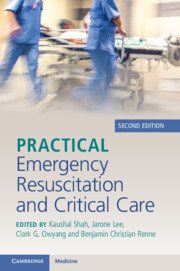Book contents
- Practical Emergency Resuscitation and Critical Care
- Practical Emergency Resuscitation and Critical Care
- Copyright page
- Contents
- Contributors
- Preface
- Section 1 General Critical Care
- Section 2 Infectious Disease Emergencies
- Section 3 Neurological Emergencies
- Section 4 Cardiovascular Emergencies
- Section 5 Respiratory Emergencies
- Section 6 Gastrointestinal Emergencies
- Section 7 Renal Emergencies
- 34 Acid–Base Interpretation
- 35 Common Electrolyte Disorders (Sodium, Potassium, Calcium, Magnesium)
- 36 Acute Kidney Injury and Emergent Dialysis
- Section 8 Hematology–Oncology Emergencies
- Section 9 Endocrine Emergencies
- Section 10 Environmental Emergencies
- Section 11 Trauma
- Section 12 End of Life
- Index
- References
35 - Common Electrolyte Disorders (Sodium, Potassium, Calcium, Magnesium)
from Section 7 - Renal Emergencies
Published online by Cambridge University Press: 02 November 2023
- Practical Emergency Resuscitation and Critical Care
- Practical Emergency Resuscitation and Critical Care
- Copyright page
- Contents
- Contributors
- Preface
- Section 1 General Critical Care
- Section 2 Infectious Disease Emergencies
- Section 3 Neurological Emergencies
- Section 4 Cardiovascular Emergencies
- Section 5 Respiratory Emergencies
- Section 6 Gastrointestinal Emergencies
- Section 7 Renal Emergencies
- 34 Acid–Base Interpretation
- 35 Common Electrolyte Disorders (Sodium, Potassium, Calcium, Magnesium)
- 36 Acute Kidney Injury and Emergent Dialysis
- Section 8 Hematology–Oncology Emergencies
- Section 9 Endocrine Emergencies
- Section 10 Environmental Emergencies
- Section 11 Trauma
- Section 12 End of Life
- Index
- References
Summary
Serum sodium (Na) concentration is mediated by free water intake, circulating levels of antidiuretic hormone (ADH) and renal filtration of sodium. Disorders of potassium, especially hyperkalemia, are the most feared electrolyte disorders due to their ability to cause life-threatening cardiac arrhythmia. Release of calcium stores into the circulation is regulated by extracellular calcium concentration, parathyroid hormone (PTH), vitamin D metabolites and calcitonin. Magnesium is one of the most abundant cations in the body and plays a large role in cardiac contractility as well as nerve conduction.
Keywords
- Type
- Chapter
- Information
- Practical Emergency Resuscitation and Critical Care , pp. 333 - 364Publisher: Cambridge University PressPrint publication year: 2023

